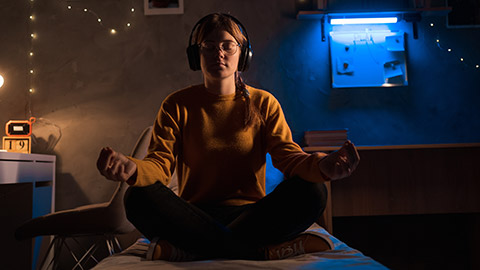I believe that the mind powers the body, and once the mind says we want to do it, then the body will follow.Lance Armstrong
Get your head in the game!
Having your headspace clear and ready for what is ahead is essential. The mind plays a valuable role in how we function in everyday life and how we succeed professionally. Our mind is influenced by so many external factors, and it influences so many factors. Think about how you feel about undertaking this course, think about how you feel starting a new business… what questions do you have for yourself? Are they:
- Can I cope with the requirements?
- Have I got what it takes?
If these questions are in your mind… get ready because we will answer these questions, and you guessed it. It starts with your mind.
Let us dive into the depths of taha hinengaro- mental wellbeing…
Before we start, complete the following activity.
Forum Activity: Defining Health and Wellbeing
The purpose of completing the quiz was to help ignite your current understanding of well-being before we unpack it on a deeper level.
After completing the documentation defining health and well-being. Download the pdf. access the Learning Activity Forum and discuss your responses on the forum with your peers and tutor to gauge an understanding of how others perceive health and well-being.
Looking beyond the absence of sickness or disease is important when defining health and well-being. Health and wellbeing are a complex physical, mental, emotional and social cycle of factors.
Each one impacts the other; if one is imbalanced, the others will soon follow. However, there are subfactors that impact the main ones which can help to enhance your overall wellbeing. According to Better Health, some of these factors include:
- Relationships including intimate ones with a partner and your friendships
- Enjoyable and fulfilling career
- Enough money
- Regular exercise
- Nutritional diet
- Enough sleep
- Spiritual or religious beliefs
- Fun hobbies and leisure pursuits
- Healthy self-esteem
- Optimistic outlook
- Realistic and achievable goals
- Sense of purpose and meaning
- A sense of belonging
- The ability to adapt to change
- Living in a fair and democratic society.
It is important to consider that if you lack one factor, you may balance it out with another. For example, if you are not in an intimate relationship with someone, you may have many friends with whom you spend your time.
The mind is one of the most significant factors that impact overall health and wellbeing.
(Better Health Channel, 2022)
Your mind is extremely powerful. You need to take as much care of it as you would your body to reach your full potential. It is often assumed that when we look at mental wellbeing, we are talking about mental illness, anxiety, depression, etc. However, this is not necessarily the case. If we are not allowing space for our thoughts, feelings, or experiences, it can often lead to these conditions. But taking care of our mental wellbeing can help manage our thoughts and feelings for a better result.
Your mind needs care as much as your body needs exercise and good nutrition. In fact, the two are often linked together. When we exercise, the body releases endorphins and endorphins make you happy, as Elle Woods so eloquently stated. Happy mind, happy experiences, happy relationships and on it goes.
Having good mental health, emotional and social well-being, and the capacity to cope with change and challenges will benefit you in all aspects of your life, including your professional life, enabling you to succeed and act as a positive role model to others.
The first thing that comes into our minds whenever we meet any business or person is their image, a fabricated perception from the interactions of our senses with the brand or person. Image is essential if you are looking at starting your own business venture. Whether creating your own brand or some form of coaching, you must first have your health and well-being in good condition. It's not only making sure that your message will be appropriately perceived. You will also set an example for others, so you must take care of yourself first. (Solomon, T. Forbes, 2016)
The following video illustrates caring for taha hinengaro from a Māori perspective.
Watch: Hauora Tane: Hinengaro - Tawhiti Kunaiti (1.28 minutes)
Running your business and spending time on social media can be demanding and sometimes overwhelming. But when you understand your health and wellbeing, and a toolkit for managing these skills, you will find some tasks less daunting, and you can share your knowledge with others.
Now that you understand health and wellbeing, we will look at how to manage it and add some tools to your inventory.
The following are some simple techniques you can apply to help manage your health and wellbeing:
- Adequate sleep
- Balanced and nutritious diet
- Regular exercise
- Practice mindfulness and meditation
- Avoid alcohol and drugs
- Socialise with friends and family
- Seek hobbies and recreational activities
- Aim to stay in the present; avoid living in the past.
(Adams, J n.d.)

Have you ever wondered why we respond better to some stimuli rather than others? Why do we like success so much and we dislike failure? It is in these situations that our brain jumps into action. There is something called neurochemistry, which explores the influence of the mind over all the organs that produce any substance that alters our behaviour or body functions.
What if somebody told you that you could get an advantage over your opponents in every game and in life by taming your mind? Believe it or not, it is backed up by science!
How the mind works with the body
Our brain interprets, stores, and transmits information. Sometimes unconsciously. This information is sent and received electrically or chemically. Our senses then consume this information.
Your brain is a factory of ingredients that tell your body how to behave according to the situation it evaluates. If you are afraid, your amygdala (a part of your brain) will alert your nervous system.
The following diagram illustrates the amygdala's location in the brain.
When the amygdala is triggered, it will signal the body to produce cortisol and adrenaline. While some areas of your body may benefit from this substance, others may be maimed or even disabled for a short time. This can include your frontal lobe, where your reasoning and decision-making come from. So yeah, you are literally hinting if you feel afraid during your matches.
Fun fact! Did you know the sense of smell triggers the amygdala?
Watch: Beautiful minds are free from fear: Robert Grant at TEDxOrangeCoast – YouTube (14:55 minutes)
This video by Robert Grand reflects on the difference between living with fear and facing scarcity or living with confidence and facing abundance.
Complete the following activity based on the video.
But, with the bad comes the good. The brain also has the power to strengthen us. Take dopamine, for instance. Dopamine is a chemical that, while released, makes us feel good and motivates us to do something for extended periods. Dopamine is the reason while playing a game that you really enjoy, you can spend countless hours on it.
However, you must be careful. The overproduction of dopamine can get you hooked into the feeling-good cycle, not allowing you to feel good later while doing everyday activities.
Stress…a key to motivation
We often associate stress with negative connotations; however, did you know there is a positive form of stress? This positive form of stress is called eustress. Eustress is a type of stress that can lead to a positive result. Eustress often becomes motivational and evokes a sense of excitement.
As an eSports player, you may often find yourself in a state of eustress while playing a game. Think about the feeling you get when battling it out with an opponent, the end is near, and the battle is fierce. You can feel the adrenaline at your fingertips, and the nerves are present, but your eye is on finishing the battle. That small wave of nerves coupled with determination is the mind and body entering a state of eustress. Now, imagine the feeling you get after completing the battle; this is the response of dopamine and endorphins.
Food for thought
Before examining food's role in our cognitive (brain) function, let’s watch the following video.
Watch: How the food you eat affects your brain - Mia Nacamulli (4.52 minutes)
This video provides an overview of the various types of food that impact brain function and activity. It discusses the properties of food, including omega-3 and fatty acids, their impact on the brain, and the roles of proteins and amino acids.
Imagine a machine. Let’s be more specific, imagine a car. For it to run, it requires many parts to work together for a common purpose. Take one part away, and you get a dysfunctional machine, not a car. And like cars, your body needs several ingredients to run properly.
Food nutrition is as important as it gets. Every component distinctly impacts your daily behaviour, development, mood or happiness. Our body is like a car engine. It needs maintenance for it to run for a long time. Taking care of it will surely sustain us for as long as possible in this lifetime.
What do we need from our food to make our bodies work and function appropriately?
Let’s take a look.
(Oil) Fats
Omega fats are the best of all the fats on the nutrition table. While regular fats may be dangerous for your long term, healthy omegas are the saviour. Omega fats are linked to stopping aging and maintaining your cells' health.
(Lubricant) Proteins & amino acids
These nutrients are responsible for how you feel and behave. Amino acids help neurotransmitters carry messages between neurons affecting things like mood, sleep or alertness- particularly important when preparing for a tournament, organising an event, coaching a team or setting the foundations for your personal brand.
Antioxidants strengthen the brain, enabling it to work and function well. Vitamins and folic acids will help your body to train, support cognitive function and help fight diseases.
(Gas/Fuel) Glucose
To make this huge muscular enterprise work, we need carbohydrates. Carbohydrates are what our body processes into glucose or sugar. The frontal lobes of the brain are very sensitive to glucose. Often, a drop in mood or mood swings are a primary indicator of poor nutrition.
Power of positive thinking
Positive reinforcement is the key to hacking our brain and gives us an edge daily. Positive reinforcement releases dopamine in our brain, altering our behaviours, actions, and thoughts. This occurs when a certain behaviour ends with a positive outcome, making this behaviour likely to be repeated.
What makes a healthy brain?
Besides all the nutrients that our body needs to function properly, it is essential that we generate certain habits to complement the stimuli in our brains. The following are crucial factors that influence healthy brain function.
- Social time with the loved ones
- Exercise for the proper function of muscles and organs
- Mental activity such as problem-solving or reading
- Sleeping the recommended hours (8-10)
- Relaxing and practising mindfulness when necessary
- Having a balanced diet.
But how do we get beyond that? Well, it is important first for you to understand that the factors we discussed are important for maintaining healthy brain functionality. However, some exercises can help us out to improve our brain performance and capacity for memory, cognition and creativity. There is quite an extensive list, but here are some activities you can practice.
Cognitive activities
- Meditation: involves concentrating your attention in a calm controlled way.
- Visualising: anticipating visually what you are about to do in your daily life before you do them may help you organise information and make appropriate decisions.
- Playing Games: board games or card games are a terrific way to stimulate your thinking and socialising skills!
- Crossword puzzles: memory can be improved by creating the habit of forcing your brain to remember anything in a small period.
- Sudoku: this Japanese game uses numbers to help improve cognitive functions.
- Socialising: frequent socialising may improve cognitive abilities and reduce the chance of dementia.
- Learning or doing something new: It may be linked with cognitive function maintenance and an excellent way to activate different areas of your brain!
- Learning a new language: each has a different origin, root and explanation. This means that several areas of the brain need to be stimulated to speak it.
- Listening to music: Music stimulates different brain parts and activates several others.
- Learning a Hobby: They usually coordinate motor dexterity and activate motor skills.

Discipline is the bridge between goals and accomplishment.Jim Rohn
Tame your emotions
Have you ever had a Snickers bar? The Snickers slogan is framed as “you're not you when you're hungry”, insinuating many of us find functioning without food difficult, which goes for many different emotions. Have you noticed when you are upset, you do not think as rationally as usual? You may make a different call within the game or get more frustrated than usual with your teammates. We often take our emotions out on the people around us. This can happen to coaches, managers, players, teachers… anyone really.
Although everyone struggles with this, there are ways for you to be more aware of how your emotions influence your day-to-day decisions.
Watch: DISCIPLINE (1:57 minutes)
Self-Awareness
One fundamental way to manage your emotions is to be aware of them. Notice they exist and acknowledge how you feel. You must be as objective as possible to make conscious and appropriate decisions. Notice your emotions but do not let them fuel your decisions.
Part of the quest we are on, begins by believing in yourself. It is easy to get caught up in self-doubt and negativity, which clouds our ability to see what we are truly capable of. Next time you question yourself; how you can make it through, think of it as a challenge… because we never know what we can accomplish unless we try.
Open mindedness
The measure of intelligence is the ability to changeAlbert Einstein
Watch What is the true definition of being open-minded? | Maryam Fuad Bukhash | TEDxZayedUniversity (4:34 minutes)
Being open-minded will have a huge positive influence on you within eSports. You will meet a huge range of people from different backgrounds and working with and understanding everyone will allow you to excel. For example, as a streamer, you will interact with many different people and navigate awkward conversations. However, just by being more open-minded, you will not cut off potential viewers or even potential sponsors.
Tip! Here are some everyday things you can do to be more open-minded:
- Trying new foods
- Watching a new show
- Starting a business venture
- Studying
- Joining a team sport
- Volunteering
- Attending cultural festivals or events
- Travelling
- Attending conferences and industry events
Concentration
An easy way to improve your day-to-day life is by improving your concentration, which can be done by disciplining your mind.
Neuropsychologist Kim Willment has suggested helping in disciplining one’s mind. A single-task exercise like reading can benefit.
"Read something for 30 minutes, setting a timer to go off every five minutes. When it goes off, ask yourself if your mind has wandered. If so, just refocus on what you're reading. By training your brain to monitor if your mind is wandering, you strengthen the monitoring process and the ability to maintain focus on a single task."
(Harvard Medical School 2020)
Expectations
- Be realistic
- Expect the best but be prepared for the worst
- Make room for failure
- This will occur at some point
- Use it as a learning curve
- Use it as motivation
- Experiment
Taha whanau ( socialising), spending time with friends and family (physically or digitally) can help give you a sense of belonging, developing and sustaining meaningful relationships. So, do you have the support to complete this course or start your business venture? Some of you may think yes, and maybe
many of you have doubts that you do not have the support. But, have no fear. This can be found anywhere – in class, a social sports team, social clubs, and discord groups.
Humans commonly desire connection with others.
Being social is showing interest and sharing your interest. A social club is a group of people who meet regularly to discuss or catch up on any (or no) topic. A book club would read a book and catch up to discuss their thoughts, and a table tennis club would meet up to practice and train.
Watch: SOCIAL (4:02 minutes)
Now that you have an insight on the importance of social interactions, let us look at expectations in the next part of the podcast.
Watch: EXPECTATIONS (2.30 MINUTES)

Gamers, like any other humans, go through fatigue regardless of the person’s fitness level or energy. There are plenty of ways a human can build resilience, it comes down to the physical and mental wellbeing. Fatigue can hit anybody anytime, and anywhere. During exercise, driving, while eating meals, studying, even relaxing.
The following are some tips to help you combat fatigue.
- Sleep Well – The recommended amount of time is 8 hours a night.
- Eat Well – What you put into your body directly links to your feelings. Don’t cheat your body! If you eat something high in sugar, you may get a burst of energy, but you will crash fast. Eat a lot of carbohydrates you will tend to feel bloated and lazy. Don’t overeat.
- Relax – Relax the body, including common techniques such as meditation or bathing. Once in a while, we all need a save location in real life. Some people watch films or play stress-free video games. The goal is to rest your brain, but this should be done in moderation. No more than 10 – 20 minutes.
- Increase Physical Activity – This is a great way to boost your energy levels over 9000!, It will also help you sleep better at night and has many other positive effects on your body and mind. Living a sedentary life without physical activity can increase the chances of fatigue.
- Move more, sit less – If there is an opportunity to stand or walk around, take the chance. Standing desk, catching up with friends, or down time between television/games and getting outside amongst nature. The human body is not designed to sit down. Even when playing online, it is vital to take care of number one first… that is you!
Watch: FATIGUE (3.25 minutes)
Sport psychology, to put it simply, is the understanding of how an athlete's mind influences their physical performance and well-being.
It is much easier for spectators to recognise athletes' physical abilities and skillsets, while the mental aspects are overlooked. However, when you see an athlete drop a football or miss an easy headshot at the professional level, it will usually come down to a mix of both physical and mental.
Your job as a coach requires you to build the confidence of all the athletes and help them perform at their peak; this includes how each athlete prefers to learn, their personality, finding their state of relaxation, mental visualization, overcoming their limiting beliefs, their self-awareness and many more.
Pre-performance routine
What we have seen is that using a PPR improves performance regardless of how simple or complex the routine isP. Gröpel
The role routines play in creating an effective learning environment cannot be understated. Almost every professional athlete will have a routine. Think of your favourite athlete and what you see them doing before a game. Routines are used by players to get their heads in the game. This may be by calming a player down or hyping one up. It can be a range of things; the important thing is that it makes the athlete feel comfortable and puts their mind in the same state as it has been while training.
Mindfulness/ Meditation
Meditation is used worldwide by all sorts of people. Sports athletes, entrepreneurs, office workers, gamers, teachers. Anybody can meditate, and it is common to hear that everybody should meditate. There are many positive benefits to meditating which include:
- Reduce stress
- Stabilise emotions
- Mindfulness
- Lower anxiety
- Improve blood pressure
- Deeper relaxation
- Improve focus.
Consistency is key: to get the rewards of meditation, you have to meditate consistently. Daily, even monthly. There are apps such as Headspace or YouTube videos you can watch to guide you through the process. For example, if you have Netflix, Headspace has an animated meditation series that you could try.
Trust your Talent
As an athlete your coach blocks out training sessions to develop skills required to play! Train your talent in practice and trust your talent in competition. To build confidence in your skills you must practice and develop that skill.
Self-Talk
Positive affirmation can improve endurance performance talking to themselves (internally or externally). “There’s more in the tank”, “One more rep”, “It’s not over until it’s over” etc.
